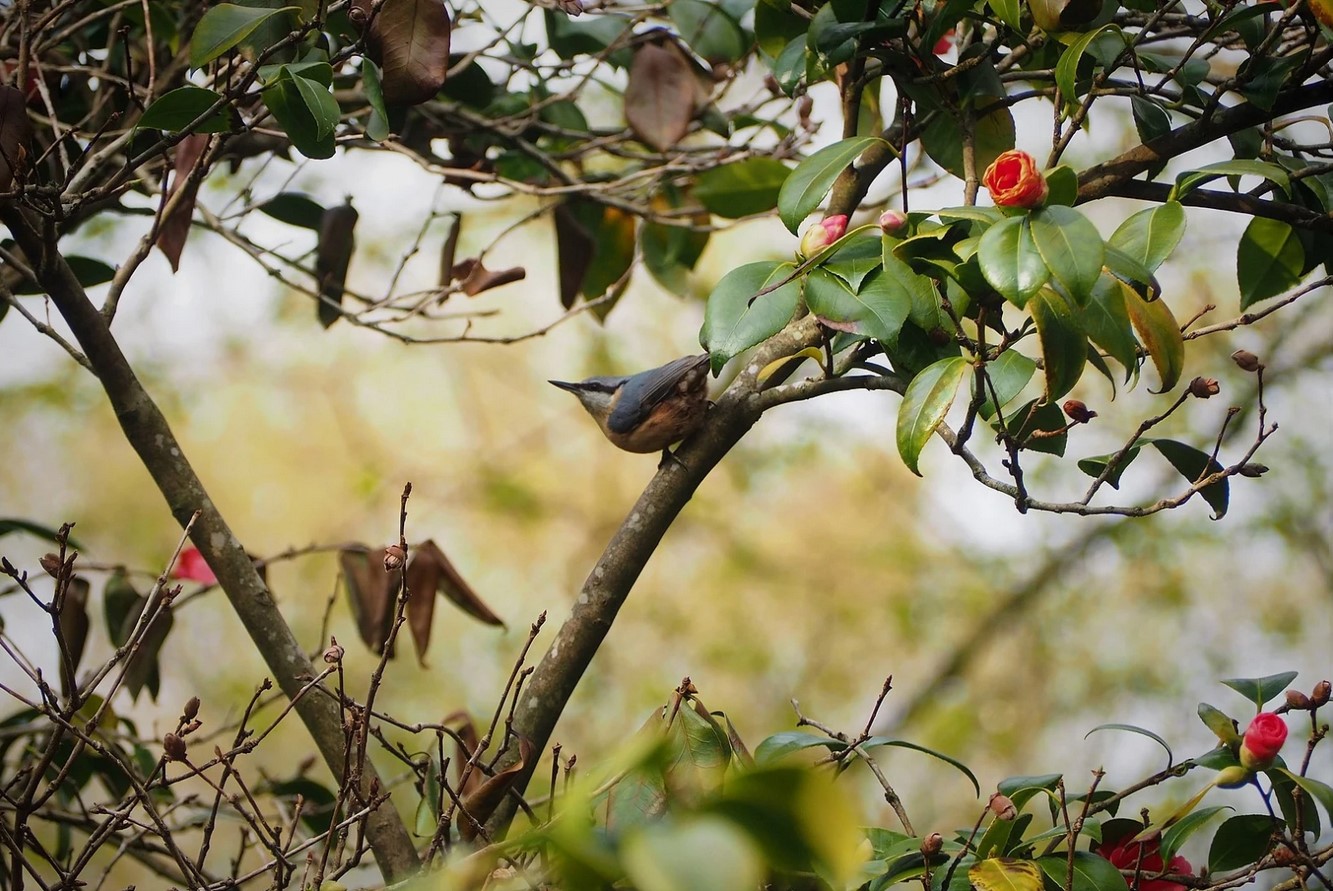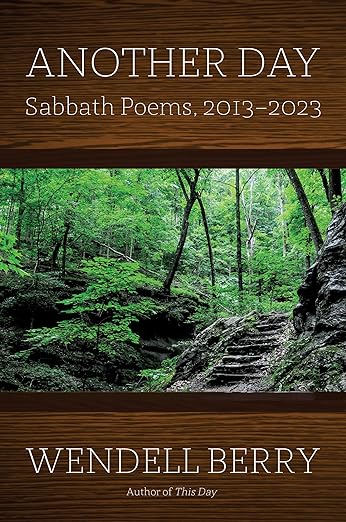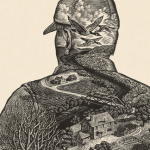Wendell Berry’s This Day collected all his Sabbath poems from 1979-2012, and now Another Day collects the subsequent eleven years of Sabbath poems. These are worthy continuations of one of the most remarkable and long-lasting poetic endeavors in American letters. And while their language and preoccupations will be familiar to readers of Berry’s earlier Sabbath poems, they form a distinctive new chapter. They are the poems of an old man, mostly written in his eighties, offering retrospective meditations on a life lived in love with a wondrous creation.
One way that this volume departs from Berry’s earlier Sabbath poems is its inclusion of poems marking his wife Tanya’s April birthday and their May wedding anniversary. Across these eleven years, there are six birthday poems and six anniversary poems along with an additional poem that lists both dates. In all the previous years of Sabbath poems, there is only one explicit birthday poem and only one poem dated to their anniversary (one of the 1982 poems that celebrates their twenty-fifth year of marriage). A few other poems in This Day do address their marriage or commemorate certain anniversaries, but in Another Day poems dated to these two spring dates form a consistent thread running through the years and make explicit his love and gratitude for his wife.
This is fitting because in all the poems gathered here we see Berry’s testimony to the way of love that he has attempted to walk faithfully: he knows his wife, his place, his community, and, ultimately, Christ through his loves. And this love is always particularized: it is a love for particular people or creatures. For instance, many poems address various family members, friends (including Ed McClanahan), and even characters from the Port William membership. Others celebrate flowers, trees, or animals such as his work dogs and his lambs and the many birds that he sees or hears. Most of all, though, the love that animates these poems is a love for one woman, Tanya.
In one of his several poems commemorating Tanya’s birthday, Berry begins by articulating once again his gratitude and wonder for her life and the life they have together made. In the last stanza, he transitions from remembering his love for her to remembering the “imperative we did not make” that their love has been an answer to:
And now I remember the hasty grave
in the garden at dawn on the third day,
the woman in despair coming early to find
that clovers opened, all alright,
as I know by love, if I know anything.
This poem enacts the paradigmatic movement of Berry’s imagination. His love for his wife enables him to know and imagine the divine love that enters creation, shares in the sorrow and death that marks creaturely life after the fall, and seeds the new, resurrected life that the risen Christ invites us all to share. In acting as “bridegroom” and “bride,” Wendell and Tanya fulfill the ancient roles by which human love responds to the divine love that creates and redeems the world.
Yet when we fail to live by love, we cut ourselves off from the possibility of such recognitions. Another poem contrasts two modes of life, one lived in service to the “Big Brain,” the idol whose worship entails burning the world “in profitable fire.” The second “looks with love upon” the world, so that “even the dark / begins to shine”:
In its lover’s gaze
it becomes seen, and by his praise
begins to be as it was made.
This is Berry’s epistemology of love, his conviction that the lover’s gaze sees and participates in what the user’s gaze can never know.
In the best of the anniversary poems, Berry opens by building two contrasting sets of images. One centers on how the birds experience the dark and cold of winter. He marvels at their ability to “survive / the long nights and the snow and the freezing rain / to emerge again into the new dawnlight / joyous and strong.” “The old man” has a different kind of winter cold to endure; he has known many more winters than these birds, so he has more reason to trust that spring and warmth will come again. But he also knows that “his own kind” are making a different kind of darkness through “their willing use of death.” This human-caused destruction threatens a more “complete” dark than even the dark of winter. And then the poem turns toward their marriage and the hope it grants:
But the old man knows, contrarily, that this world
was made by love. He knows it because that love
came to him one time in the person of a girl
and it abides in the girl’s great-grandmotherhood.
It is with him and in him, through the dark and cold
of winter nights and human wrong, like the song
of the least birds’ thanksgiving when they wake.
While Jayber Crow is not a particularly autobiographical character, what Berry describes in these poems to Tanya seems very much akin to Jayber’s way of love, through which his love for Mattie ushers him in to a love for his place as it is loved and held by God. As Jayber describes his experience, it is through his experience of love for Mattie that he can finally imagine “a Father who is yet like a mother hen spreading her wings . . . before the dark night for the little ones of Port William to come in under, some of whom do, and some do not. . . . I could imagine God looking down upon it, its lives living by His spirit, breathing by His breath, knowing by His light, but each life living also (inescapably) by its own will—His own body given to be broken.” (Sarah Reardon and I have written more about the theological antecedents for this epistemology of love in Jayber Crow.)
Given the poems’ explicitly personal subjects and tone, it remains appropriate to read “the old man” or the “I” as Berry himself. His commitment to straightforward, plain speaking flows from his desire to, as he has written elsewhere, stand by his words. With the exception of poems written in the voice of one of his fictional characters (several reference the Rowanberrys and one mentions Flora Catlett), these are written in Berry’s own voice. They eschew formal meter or rhyme in favor of a direct, often religious mode of address. Yet their simplicity can be deceptive; these poems are by no means artless. Their mode of address is itself an aesthetic choice, one that comes from Berry’s habit of Sabbath walking and seeks to bear witness to the fruits this discipline brings.
While the poems in honor of Tanya form a thread that runs through the book, the book ranges widely from this basic conviction of the primacy of love. In addition to the more expected poems about the woods and the life patterns of its plants and animals, there is a sequence of nine 2014 poems that address how our technologies erode creaturely life and love. How might we inhabit Sabbath rhythms, Berry seems to be asking, in a world ordered to machines?
The machine that helped a man to think
ticks on in absence of the man.
The communications technology that was
to become the concourse and meeting
of all the world, bringing the longed-for
peace to all the world, becomes
a weapon to break the world in pieces.
There are two poems that reflect on the life of his Uncle Wendell, the man for whom he was named and the man whose murder in 1944 is the subject of Berry’s novel A World Lost. There are poems about the incarnation and resurrection, the theological realities that most animate Berry’s imagination. One of these returns to Piero’s painting of the resurrection, which a previous Sabbath poem responds to as well. There is a long dream poem from 2023 that poses a conversation between the poet and a “familiar voice” who tells Berry that “Your hard virtue was desire / for everything you thought was good.” Over the course of the poem, the two go back and forth in discussing the need for such desire to animate one’s life, but also the myriad ways in which desire can verge toward lust. Yet the voice concludes that the poet’s nightmare vision of his beloved place utterly destroyed reveals to Berry the depth of
“your love for this place as it was
and as you hoped it might become[.]
Your dream of the ruin of your home land
now brings alive in you your small
share of the greater love that made
the heaven and the earth. Highest
and whole, that love is the Sabbath morning
where you at last may come to rest.”
In this dream poem, Berry tells his interlocutor that he’s learned how a human economy should be built on two principles: love for the world, and kindly use. And several of the other poems explore what kindly use would entail. For instance, one long series of poems puts farming practices in conversation with Wes Jackson, Albert Howard, Alan of Lille, William Wordsworth, Pierre de Ronsard, Shakespeare, Edmund Spenser, Geoffrey Chaucer, John Milton, and George Herbert. “Love is the crisis of our work,” one of these poems asserts:
When the watcher speaks of love
he is speaking not of history, not
of past or future, but of the love
in which all time has moved, in which
all things were and are and are to be,
the love that is before the beginning,
that is beyond the end, that is
entirely present as the flower of a day.
As has been true from the earliest Sabbath poems, Berry’s theological convictions always remain near the surface. But he continues to evade cliché by grounding the poems in his place and the creatures whose lives and loves enable him to imagine the Creator’s love. One might think that after forty-four years of writing these Sabbath poems, Berry would run out of things to say. But it seems that as long as the trees continue their silent conversion of light to soil, as long as the sun and the moon endure, as long as he has life and breath, Berry will continue his acts of Sabbath praise. In this way he is like the birds who sing anew each day:
The hidden bird is singing
“All right. Yes. Yes yes. All right.”Nothing worth saying
ever is finally said.






